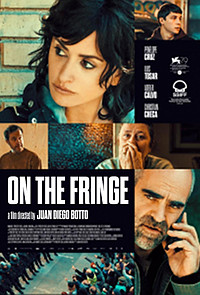| SHADOWS ON THE WALL | REVIEWS | NEWS | FESTIVAL | AWARDS | Q&A | ABOUT | TALKBACK | |||||||||||||||||||||
 Shadows off the beaten path Shadows off the beaten pathIndies, foreign, docs and shorts...
On this page:
ARGENTINA, 1985 |
ON THE FRINGE |
SAINT OMER
| |||||||||||||||||||||
| See also: SHADOWS FILM FESTIVAL | Last update 19.Sep.22 | |||||||||||||||||||||
|
Argentina, 1985 Review by Rich Cline |  MUST
MUST  SEE SEE
| |||||||||||||||||||||
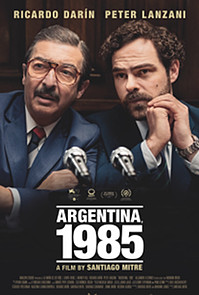 dir Santiago Mitre scr Santiago Mitre, Mariano Llinas prd Agustina Llambi-Campbell, Santiago Carabante, Santiago Mitre, Federico Posternak, Ricardo Darin with Ricardo Darin, Peter Lanzani, Alejandra Flechner, Laura Paredes, Norman Briski, Hector Diaz, Carlos Portaluppi, Claudio Da Passano, Santiago Armas, Alejo Garcia Pintos release Arg 29.Sep.22, US 30.Sep.22 22/Argentina 2h20   Is it streaming? |
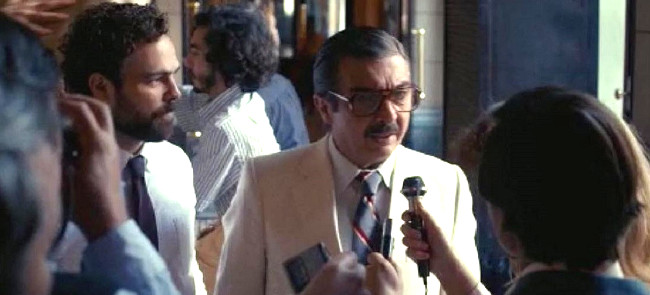 Including a heavy dose of sharp humour in the screenplay helps make this rather momentous true story unusually accessible. So while it hinges on a procedural investigation and historical courtroom trial, director-cowriter Santiago Mitre continually reveals the humanity of the characters, pulling us in deeper. And the case itself is harrowing, a landmark moment when a military dictatorship went on trial for its horrific crimes against the people. As Argentina begins reckoning with the violent torture and murder of its people by a ruthless military junta from 1976 to 1983, the task falls to prosecutor Julio Strassera (Darin) to prosecute the dictators. The constant death threats are shrugged off by his wife Silvia (Flechner) and children, and his deputy Luis (Lanzani) has no experience but a sharp mind. They assemble an unusually young team and set out to gather evidence of 709 specific crimes, representing thousands. But it seems unthinkable that these still-powerful armed forces leaders will ever be sent to prison. Witty interaction gives the film a surprising electrical charge, making darker elements even more devastating. Without going into too much detail regarding torture, what's described is absolutely horrific, and scale could have been mind-numbing without such personal filmmaking. This also helps us identify vividly with characters, while seeing this situation echoed in present-day politics as former heads of state face consequences for actions taken when they felt above the law. Veteran actor Darin makes Julio feel wonderfully competent; even when he's unsure, we know he's on the right track. His sardonic comments bring harsh things into perspective, and he has wonderfully abrasive camaraderie with his family and colleagues, drawing both strength and inspiration. His partnership with the likeable Lanzani's whip-smart Luis develops beautifully over the case. And as Silvia, Flechner adds fabulously sardonic moments that run very deep. Meanwhile, Paredes gets a show-stealing role as a key witness who resiliently recounts a staggering ordeal. These true events are important in world history, a pivotal change in how leaders are held to account, eventually. A line in the film equates this trial with Nuremberg, but this is perhaps even more earth-shaking. And what sets this film apart is the way a young legal team bonds over their desire to set the historical record straight, because they are the ones who will inherit the leadership of their country. They want it to be a just place to live. Obviously, they're not there yet, but this first step was massive.
| ||||||||||||||||||||
|
On the Fringe En los Márgenes Review by Rich Cline | 
 Is it streaming?
| 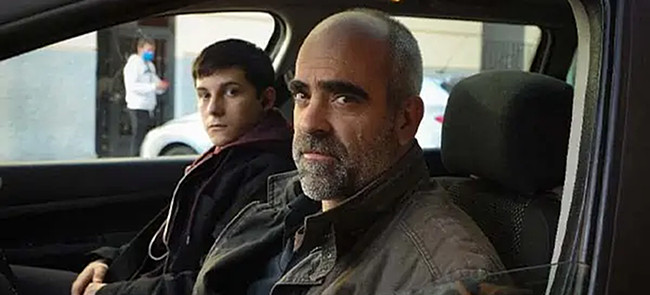 While this drama centres around a specific political topic in Spain, its repercussions are wider, as are its emotional resonances. Actor-filmmaker Juan Diego Botto is tackling evictions that have thrown nearly half a million people from their homes, often due to unfair banking. Several story threads interconnect in ways that sometimes feel pushy or heightened, as people flail angrily at a cruel system. But it's also hugely moving. In Madrid, Azucena (Cruz) turns to an activist group for help when she and her son are threatened with eviction. Her lawyer Rafael (Tosar) is stuck with his teen stepson Raul (Checa) all day, because he stopped to help a friend (Levi) at risk of losing custody of her daughter. And Rafael has several other key things to do before meeting his wife (Villagran) for an amniocentesis. Meanwhile, construction workers Manuel (Botto) and German (Garcia) bond on-site, even as each has issues boiling over at home. And German really needs to call his mother (Calvo). Over the course of one day, exhausting desperation drives the various narrative strands, with frequent moments that are wrenchingly hard to watch. Each person has a short fuse, which is understandable in the circumstances. Botto's direction dives straight into fraught situations without much set-up, so it takes awhile for the viewer to work out what's happening and how these people connect. As things come into focus, the rather fragile plot links are less important than emotions these distracted, overstretched people share. Cruz gives a wonderfully stripped-back performance as a steely woman unwilling to lose any sense of control. Her inner resolve is inspiring, especially in later scenes with her husband, who has given up. In the focal role, Tosar's bullish Rafael never stops moving, revealing a man who risks his own life to help others. His shifting relationship with Checa's likeably sardonic Raul gives narrative arc to the film. And side roles provide strong moments for the supporting cast. Botto weaves in real news footage, grounding the chaos in facts. So the constant motion has a compelling kick. At the centre, Rafael's odyssey of police action, protests, bureaucracy, traffic jams and more is grippingly entertaining, mainly because each step along the way reveals something new about the characters and the central topic. And the film gives dignity to people who work multiple jobs while struggling against each impending financial disaster, while the wealthy have the nerve to call them lazy.
|
| Saint Omer Review by Rich Cline | 
| 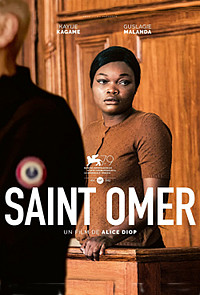 dir Alice Diop scr Alice Diop, Marie N'Diaye prd Toufik Ayadi, Christophe Barral with Kayije Kagame, Guslagie Malanga, Valerie Dreville, Aurelia Petit, Xavier Maly, Robert Cantarella, Salimata Kamate, Thomas De Pourquery, Salih Sigirci, Fatih Sahin, Atillahan Karagedik, Mustili release UK Oct.22 lff, US Oct.22 nyff, Fr 23.Nov.22 22/France 2h02  TORONTO FILM FEST  Is it streaming?
| 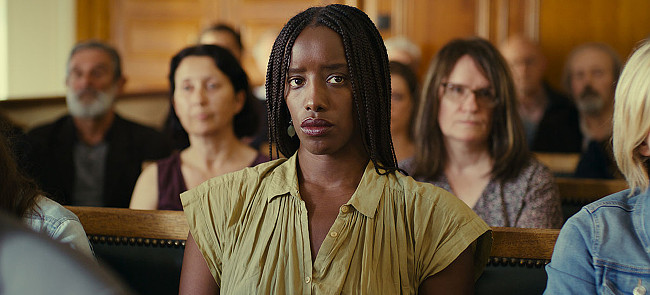 There's a terrific story at the centre of this French drama, bursting with powerful themes and clever juxtapositions. But filmmaker Alice Diop remains in her head while she puts this onto the screen, as chilly, inexpressive scenes remain stubbornly out of reach. It's very sharply shot, as a genuinely riveting courtroom case steals focus from the loosely undeveloped plot thread that is clearly meant to be the film's main thrust. To follow her acclaimed first novel, Rama (Kagame) is writing a spin on Medea linked to a sensational trial in Saint Omer, where Laurence (Malanga) has been charged with murdering her 15-month-old daughter. She admits she did it, but pleads not guilty due to a madness that took her over due to social, economic, cultural and personal issues. As a Senegalese woman in France, Laurence had little say in her life, pushed by both her mother (Kamate) back home and her married boyfriend (Maly) in France. With no options, she turned to mysticism for advice. While Laurence's story is powerfully involving, Rama is the film's protagonist. But she never looks anything but blankly miserable, whether visiting her family, sitting in the courtroom or interacting with other characters like her boyfriend (De Pourquery) or Laurence's mother, who takes an interest in her for some reason. Even when an unexpected connection emerges between Rama and the case, she remains unchanged, concealing her thoughts. This may cleverly reflect the rift in thinking between Africa and Europe, but it leaves the audience frustratingly out of the loop. That said, Kagame's tightly internalised performance is intriguing, simply for what it refuses to reveal. It's clear that these events are affecting her deeply, although she has no visible character arc. By contrast, Malanga delivers a stunningly nuanced turn as a young woman who can't explain her behaviour simply because she doesn't understand it herself. Her account of her actions is devastating, and the reactions of the judge (Dreville) and lawyers (Petit and Cantarella) reveal superbly understated emotions. Diop's approach is deliberately opaque here, provoking the viewer to become personally involved in what's seen and spoken, as well as unspoken. This works beautifully for Laurence's story, especially as it grapples with the way we all use truth and lies without knowing why. But extended flashbacks to Rama's relationship with her mother reveal nothing, leaving an odd vacuum right at the centre of the film. And a glimpse of Pasolini's Medea is so powerful that it almost upends everything.
| 
See also: SHADOWS FILM FESTIVAL © 2022 by Rich Cline, Shadows
on the Wall
HOME | REVIEWS | NEWS | FESTIVAL | AWARDS
| Q&A | ABOUT | TALKBACK | | ||||||||||||||

